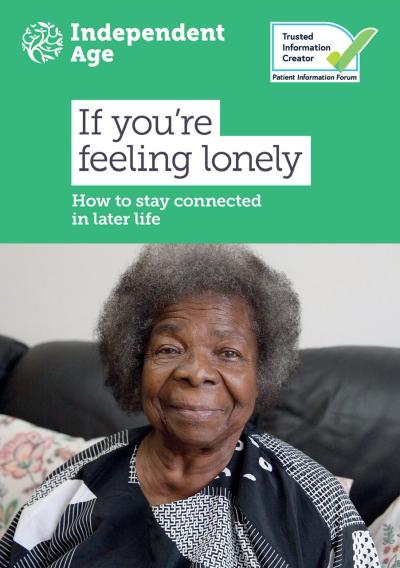Related publications

Loneliness can affect us all, whether we live alone or are surrounded by others. People feel lonely for all sorts of reasons and they find different ways to overcome it. Here are a few things that may help to reduce feelings of loneliness and some places to look for more support.
Loneliness is the feeling of sadness that can come from not having the social contact you would like. It may be the result of social isolation. But you could be surrounded by people and still feel lonely. Maybe you are feeling lonely because of an event or change in circumstances. Or you may have felt lonely for some time.
Some common experiences of older age could make you more likely to feel lonely, such as:
You may also feel lonely if:
These are just a few examples. There may be no particular reason why you feel lonely and you don’t need to look for one.
Loneliness and depression are different experiences, but they are linked. One can lead to the other. If you’re feeling low, visit our mental health hub. Find out more about depression and where you can get help, as well as ways you can keep yourself mentally well.
It can help to be aware of when you’re feeling lonely, so you can try to change things - for example, you could try keeping a simple journal for a week. This may help you to see if there are particular times or situations that bring on feelings of loneliness.
Look for opportunities to feel more connected. You could try setting yourself a weekly target, such as phoning an old friend or speaking to your neighbour. Our guide If you're feeling lonely has more suggestions.
If there are practical barriers that are stopping you from getting out, such as caring for someone or lack of money or transport, you may be able to get support. Call our Helpline for advice.
If you’ve been feeling lonely for a while, it might feel daunting to go out and meet new people. You might worry that others won’t understand you or want to spend time with you. If your confidence is low, noticing how you’re feeling and reaching out to others can help.
Try to be kind to yourself and challenge negative thoughts. You could try using self-help resources, such as:
Self-help isn’t right for everyone, so speak to your GP if you think you need some support. They might refer you for a short course of counselling through the NHS. If you live in England or Scotland, you can also refer yourself.
If you’re going through a difficult time and need some emotional support, you might find it useful to talk about what you’re feeling. If you have people close to you, try reaching out to them. Loneliness affects almost everyone, so they’ll probably be able to empathise.
If you’d rather talk to someone who isn’t close to you, there are organisations that can help, such as:
If you feel you need some practical and emotional support to make the most of the opportunities in your community, there are organisations that can help.
Our Staying connected webpage has ideas on how you can boost your social contact.
For some people, the loss or lack of a partner can be the hardest thing to cope with. You may have people around you but miss having one person to share your life with. Being single and lonely can be very difficult. You might feel you want to put all your energy into meeting new people. But learning to spend time alone and building other supportive relationships can help you to feel less lonely, whether or not you’re looking for a partner.
If you do feel ready to start a new relationship or friendship, there are many ways to meet people. Joining a group can be a good way to spend time with others and get to know them at a pace that suits you. See our Staying connected webpage for some ideas of groups you could join. Some people also try online dating – it's an increasingly popular way for people of all ages to meet new partners.
This may feel like the opposite of what you should be doing but being on your own is different from being lonely. Learning to enjoy your own company can help you to feel less lonely even when you don’t have others around you.
Try using your time alone to learn a new skill or indulge an interest your friends don’t share.
If you find it hard to relax, you may find it helpful to practise mindfulness. This involves focusing your mind on the present moment, for example by concentrating on your breathing. Mind has more information.
Spending time outdoors – or even looking out of a window – can help you feel connected and ease feelings of loneliness.
If you want more company at home, you could consider getting a pet. Many people find them very comforting. Having a dog that needs walking would also give you a reason to get outside and keep active. If you wouldn’t be able to keep your own dog, you could sign up to look after or walk one for someone else through organisations like The Cinnamon Trust or Borrow My Doggy.
